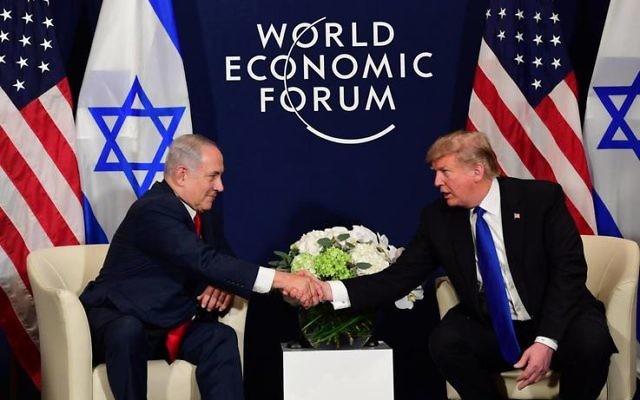Trump tells Palestinians ‘talk peace or lose aid’
If the Palestinian Authority doesn't talk peace, it may be headed towards financial collapse, following Donald Trump's latest announcement.
IF the Palestinian Authority doesn’t talk peace, it may be headed towards financial collapse, following Donald Trump’s latest announcement.
The PA won’t be getting any more US aid unless it stops boycotting the US as a peacemaker, and sits down to talk peace with Israel.
It risks “hundreds of millions” of dollars, Trump said at the World Economic Forum in Davos. “That money is on the table and that money’s not going to them unless they sit down and negotiate peace.”
Last year, America gave the Palestinians US$363 million – and contributed a similar amount again via the United Nations agency for Palestinians.
This is about a third of the agency’s budget, and when it comes to direct US aid, in some years US contributions account for about a sixth of the PA’s funds.
Trump is using strong-arm tactics to confront the Palestinians, who started snubbing the US and declaring peace talks hopeless after he declared Jerusalem to be Israel’s capital two months ago.
He was shocked that Palestinians went through with a snub of his Vice-President Mike Pence, who visited Israel last week. “They disrespected us a week ago by not allowing our great Vice-President to see them,” Trump complained in Davos.
Experts say that for the Palestinians, there is even more at stake than American money. A source familiar with international aid arrangements told The AJN that if Trump carries through on his threat, the cost to the Palestinians could far exceed American aid.
“If the US is giving money then other people feel covered, and if they aren’t the opposite is true, so the impact of this could be more than money directly lost from America,” he said.
Trump confirmed that his position on Jerusalem has changed since his December announcement. Then, he said that America hasn’t jumped to any conclusions on what borders would look like under an Israeli-Palestinian peace deal – and then tweeted otherwise.
In Davos he removed doubt over whether his tweet trumped his original speech, saying: “We took Jerusalem off the table, so we don’t have to talk about it anymore,” he told Netanyahu. “You won one point, and you’ll give up some points later on in the negotiation, if it ever takes place.”
Currently, there are no negotiations in the pipeline, and on the home front tensions are high.
As The AJN went to press, Palestinian officials were claiming that a 16-year-old was killed by the Israeli military during clashes in the West Bank.
The IDF said that rioters were attacking soldiers with stones and tyres at the time of the incident, and said it was investigating what happened.
For Israel, the Davos summit was less about the Jerusalem recognition and relations with the Palestinians and more about other strategic issues, and about Israeli trade.
Netanyahu met Trump, and spoke about their shared belief that the West’s nuclear agreement with Iran needs to be altered or abandoned.
The Israeli leader told Trump: “You’ve said that if its fatal flaws are not fixed, that you should walk away from it. And I want you to know that if you decide to do that, then we will back you all the way.”
Netanyahu discussed Iran with French President Emmanuel Macron and German Chancellor Angela Merkel – and after the summit went to Moscow to discuss Iranian influence with the Russian president.
Several Israeli delegates told the summit that the sky is the limit for Israeli trade and innovation – and one of them, the son of the late Shimon Peres, declared that the time has come for business relationships between the Jewish state and the Arab world.
Chemi Peres, chairman of the Peres Centre for Peace and Innovation, said: “I am willing to meet any leader or entrepreneur from the Arab world, from a belief that there is tremendous potential for cooperation with the developing Arab world.”
Peres stated, “We must meet and promote the construction of a science and technology bridge between Israel and the Arab states. I am a great believer in the potential of our collaboration with the Arab world.
“The Arab economy is growing rapidly, with a large population of young people under the age of 25. The young generation of the Middle East must be empowered and given a future of peace, innovation and hope. We must create new jobs for them. This important step will support the diplomatic process and strengthen the ties between Israel and its close and distant neighbours.”
Netanyahu talked trade with several international figures. The Croatian Prime Minister Andrej Plenkovic agreed with him to move forward on the purchase of Israeli F-16s, and to expand economic, security, water, agricultural, academic and tourism cooperation.
He spoke to Czech Prime Minister Andrej Babis and Dutch Prime Minister Mark Rutte about ways to increase cooperation.
NATHAN JEFFAY


comments